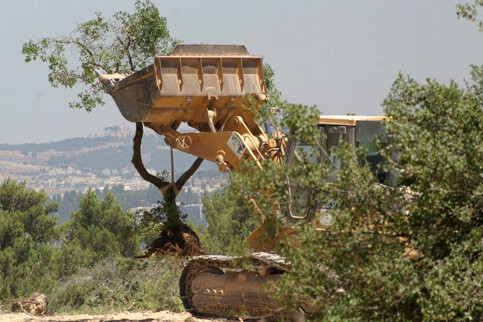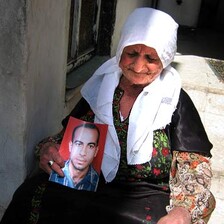The Electronic Intifada 17 August 2007

Israeli bulldozers destroy trees in al-Wallageh village for the construction of the wall near the West Bank city of Bethlehem, 15 August 2007. (Haythem Othman/MaanImages)
BETHLEHEM, 16 August (IPS) - Israeli forces began Wednesday to bulldoze hundreds of trees on land owned by a Catholic convent near the city of Beit Jala near Bethlehem. This section of forest is being razed, according to Israeli plans, to complete a section of the separation wall, which continues to carve the West Bank into pieces.
Near the convent, the Israeli settlement colonies of Gilo and Har Gilo, behind the wall on Palestinian lands, continue to expand over the rocky hillsides.
When this section of the wall is completed, several villages will be separated from each other and the greater Bethlehem area. But this is not an isolated incident these days in the West Bank.
A few kilometers east of the Cremisan convent and Bethlehem city, the small Palestinian village of Wadi Rahaal is facing extinction as a result of expanded Israeli settlement policy and the widening path of the wall.
“We are now surrounded by the settlement of Efrat,” Suha Ziyada, 22, one of the 750 residents of Wadi Rahaal tells IPS. “They started constructing the wall several months ago … and the settlement is growing every day.” Efrat settlement colony, part of the Gush Etzion settlement bloc, currently houses approximately 9,000 settlers, including Israelis and immigrants from the US, Canada, South Africa, Britain and Russia.
The Efrat settlement colony website states that “a garden city has blossomed in the Judean hills.” Yet one can see that large swaths of forest area and wilderness have been destroyed as the settlement grows, and settler-only roads cut the hillsides in half.
“This used to be a beautiful forest where we would go for picnics,” Ziyada tells IPS, pointing to a hill near her home. “But now, it’s been all cut down. The top of the hill is all gone. There used to be wildlife here, many different animals that would live in the forest. But they’re all gone too.
“We can’t build any more houses in the village. The Israeli military prohibits any villager to expand their home and build on the land. A few months ago, [the Israeli military] destroyed three houses at the edge of the village because a settler complained to the military that he didn’t want to see Arab houses from his window. So the military came in and destroyed the houses.”
Ziyada also tells IPS that the settlement practices collective punishment in many ways to eradicate the villagers from their land. “The water supply comes from the settlement, so they control it. Last month, we didn’t have running water for three weeks. They cut the water and said there was damage to the pipes, even though we knew it wasn’t true.”
Last year, the Israeli military blocked every road but one in and out of Wadi Rahaal and installed a locking metal gate on the remaining road that imprisons the villagers every evening. The soldiers lock the gate at arbitrary times; there is no set schedule, and many residents find themselves unable to enter or leave their village at regular hours.
“The settlers enter Wadi Rahaal, they walk around to intimidate and frighten the villagers. They throw rocks at our heads and they are all armed. There are also Israeli helicopters that fly over the village very low. There are checkpoints all over the village,” Ziyada says.
Just two weeks ago, Ziyada gave birth to a daughter, Mayar. “I was scared to death to give birth during the closure. When I went into labour, the gate was closed and locked. We tried to go around through another road, but it was impossible. So my mother went to have a fight with the soldiers in the settlement. We have no hospital, no clinic in the village, so I had to go to the Bethlehem hospital.”
After hours of anxious waiting for an Israeli soldier to come and unlock the gate, Ziyada, in active labour during that time, was finally able to reach the hospital.
The anxiety of waiting for someone to unlock the gate was worse than the labour pains, she says. “That feeling kills you; not having the ability to control your own life and not having the ability to give birth in security. This is the situation of all the Palestinian women here. The pregnant women are all afraid of what will happen when we give birth.”
Meanwhile, the Israeli Interior Ministry has issued a report stating that the population growth of Israeli settlers is double that of the civilian population living inside the 1948 borders of Israel proper. The Ministry revealed that there are currently 275,156 settlers living in illegal settlements in the West Bank, a 5.45 percent growth from last year’s census figure of 260,932.*
The fact that settlers are continuing to colonize the West Bank is in direct contravention to international law. Article 49 of the Fourth Geneva Convention stipulates that “the occupying power shall not deport or transfer parts of its own civilian population into the territory it occupies.”
Dr. Mustafa Barghouti, leader of the Palestinian National Initiative, a party that places itself apart from both Fatah and Hamas, told IPS in an emailed comment that Israel is pushing forward with settlement expansion projects across the West Bank, which “immediately negates any possibility of a contiguous Palestinian state … these developments further support the PNI’s long-stated claim that Israel has no intention of ending its occupation of Palestinian territory or abiding by international law. Rather, the Israeli government remains content with its goal of the continued illegal expropriation of Palestinian land.”
Ziyada says that she is afraid for her daughter’s future. “Being a mother is a wonderful feeling — but in this situation, it kills your dreams. Everyone wants to have a child, to provide them with the best life, but I can’t take my daughter to the clinic when she is sick. I just think, what if she gets sick at night when the gate is closed, what shall I do?”
* Editor’s Note: This figure does not include the 250,000 settlers in East Jerusalem, which is considered part of the West Bank under international law.
All rights reserved, IPS - Inter Press Service (2007). Total or partial publication, retransmission or sale forbidden.





